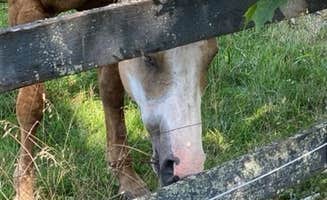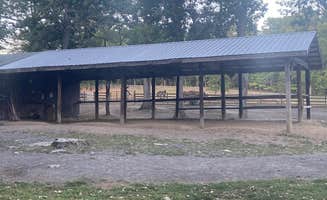The Millville area of West Virginia offers equestrian-focused camping opportunities within driving distance of both Virginia and Maryland. Located in the eastern panhandle region, this area sits at the junction of the Shenandoah and Potomac Rivers with elevations ranging from 400 to 800 feet. Summer temperatures typically reach the mid-80s with higher humidity, while spring and fall offer milder conditions for horse camping activities.
What to do
Trail riding opportunities: At Fort Valley Ranch in Virginia, campers can enjoy direct access to trail riding. "Within a 10-minute drive, there are opportunities for hiking and river activities. We found a river access point perfect for swimming and wading," notes Jason G., highlighting the diverse activities beyond horseback riding.
Shooting range access: The Cove Campground offers multiple outdoor activities beyond equestrian facilities. "On top of them having an outdoor gun range... they have a small beach, picnic tables everywhere, a volleyball ball sand court, a dock, you can fish in the lake, rent non motorboats, ATVs welcome," reports Shanna B., who frequently visits the campground.
Historical exploration: For those willing to drive about an hour north, Gettysburg provides historical activities. "We did Park Ranger tours to learn about the 1st shot and how the war started to stand in the footsteps of General Buford at Senitary Ridge in the cupola overseeing the battlefield," shares MJ B. about their stay at Artillery Ridge Campground. Many horse campgrounds near Millville serve as good base camps for historical day trips.
What campers like
Diverse water features: Campers appreciate the fishing and swimming options at campgrounds near Millville. "The kids were able to fish for hours at the two fishing ponds, which both were stocked with bass and bluegill," reports Jason G. about Fort Valley Ranch, adding value beyond just horse facilities.
Clean facilities: Many equestrian campgrounds maintain high standards for comfort. "All the bathrooms and showers were remarkably clean and well-maintained," notes a Fort Valley Ranch visitor. This sentiment is echoed at Bull Run Regional Park where Yvonne B. states, "The best review I can give us of the bathrooms. They're with staying again alone. Locking doors, individual stalls. Hot dog. Best camping showers I've ever had."
Spacious sites: Campers consistently mention appreciating room to maneuver with horse trailers and equipment. "Our site (site 3) was an easy level pull-through site, making the setup/breakdown very quick and painless. All the RV sites were impressively level, with only minimal leveling needed," reports a Fort Valley Ranch visitor, noting the convenience for those traveling with horses.
What you should know
Seasonal considerations: Summer visitors should prepare for potential issues at certain campgrounds. At Teaberry Parking Area in Michaux State Forest, one camper reported: "The first 3.5 days there were lantern flies actively trying to get into our rig, digging themselves behind the window screens, etc. and then day 4 they were gone. It was traumatic."
Road access concerns: Some horse-friendly campgrounds near Millville have challenging access roads. As Jason G. notes about Fort Valley Ranch: "I was initially concerned about the road leading into the campground, as my rig is over 50 feet in total length. However, we were surprised that the winding roads presented no issues for us."
Cell service limitations: Connectivity varies significantly at campgrounds within 45 miles of Millville. At The Cove Campground, Karl S. mentions: "It's worth noting that cell service is minimal to nonexistent — not a big deal for most campers, but something to keep in mind."
Tips for camping with families
Multi-activity options: Families appreciate campgrounds with diverse activities beyond riding. Christopher K. notes about The Cove Campground: "The beach is large and clean. The staff was very friendly. Camp one had flush toilets on one end, a pit toilet on the other. Campsites were spacious and mostly level."
Educational opportunities: Consider equestrian campgrounds near historical areas. At Artillery Ridge Campground, MJ B. shares: "Behind the campsite we stayed at, we learned connected to Stangler Farm, which served as a hospital for the wounded. Literally right outside the entrance of the campgrounds is where the battlefield starts."
Kid-friendly amenities: Look for campgrounds with dedicated children's areas. At Bull Run Regional Park, Bridget H. reports: "Our family stayed here in a cabin on a long weekend trip to DC. This campground was full of stuff to do and we didn't even get to do a lot of it. The campground had a climbing wall on one afternoon. There are miles of trails and my gkids enjoyed the nature scavenger hunt."
Tips from RVers
Site selection strategy: When booking at equestrian campgrounds with your RV, location matters significantly. At Gettysburg Campground, Jim G. advises: "The two drawbacks are that the sites are quite packed together and the noise of traffic– at least in the frontmost sites– can get rather loud at night." Request sites away from main roads when traveling with horses.
Hookup considerations: Horse camping facilities often have varied utility setups. Christopher K. notes about water access at The Cove Campground: "There are 4 water spigots in camp 1. However all the travel trailers hooked up, which means you either had to make friends or disconnect their water in order to have access."
Leveling preparation: Terrain at equestrian campgrounds can be challenging. Roberta K. from Bull Run Regional Park suggests: "Our site was very level, but I could see that some others were not so much, so you might want to ask about that." This is especially important when positioning horse trailers alongside RVs.



